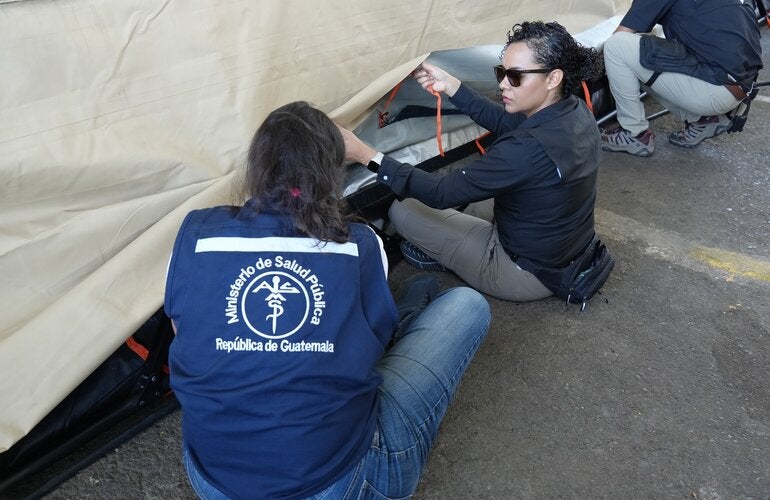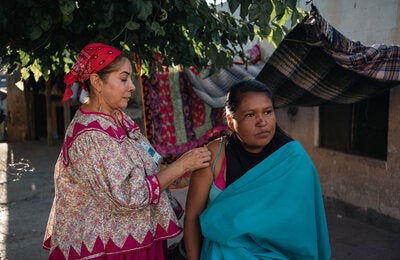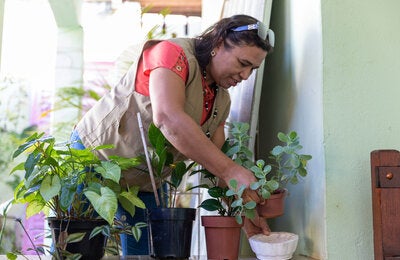
San José, May 6, 2025 (PAHO) – Costa Rica reinforced its commitment to regional emergency preparedness by actively participating in two strategic exercises, highlighting the importance of inter-institutional collaboration and regional interoperability.
The first was the Inter-Institutional Coordination Exercise conducted under the Global Health Emergency Corps (GHEC) initiative.
From April 1 to 4, 2025, representatives from the Ministry of Health, the Costa Rican Social Security Fund, the National Commission for Risk Prevention and Emergency Response, the Costa Rican Red Cross, the Costa Rican Fire Department, the National Insurance Institute, and other health sector entities and the National Risk Management System participated in a national exercise aimed at strengthening emergency preparedness.
Over four days, technical sessions, group dynamics, and simulations were held to improve coordination between institutions in the face of national and international health threats.
The activities also promoted the development of leadership and collaborative spaces as part of the national response structure, in line with the GHEC framework principles.
“Central America is a region where combining and organizing joint efforts is key, which aligns very well with the GHEC framework and methodology. We do not intend to present a new network but to see how we can work together, how we can optimize resources for a much more efficient response. We are confident that Costa Rica has much to teach us and much to show us,” said Luis De La Fuente, PAHO/WHO Regional Advisor for the Health Emergencies Department.
During the activity, the national exercise was integrated into the “Polaris 2025” Pandemic Response Simulation, led by the World Health Organization, which brought together more than 15 countries to practice coordinated responses to a hypothetical health threat. Costa Rica actively participated in international technical meetings, decision-making simulations, and real-time information exchange exercises with the PAHO Emergency Operations Center (EOC).
“This exercise aimed to put into practice inter-institutional response procedures to international health threats. Efficient coordination and interoperability processes are key to ensuring timely interventions in health emergencies,” said Mariela Marín, Deputy Minister of Health of Costa Rica, thanking PAHO for its support and the commitment of the National Risk Management System.
From April 7 to 10, Costa Rica also hosted a field exercise that brought together Emergency Medical Teams (EMTs) from Central America. The goal was to strengthen clinical and operational interoperability, standardize procedures, and build a more cohesive regional response.
Coordinated with PAHO, this exercise was led by Costa Rica's EMT and included the participation of national EMTs from El Salvador and Guatemala, focusing on mutual learning and the exchange of best practices among the teams.
This real-time deployment achieved significant progress in three key areas:
- Strengthening regional coordination for joint emergency deployments.
- Operational validation of technical and operational procedures.
- Promoting an integrated response where all countries enhance their capabilities through knowledge and experience exchange.
“We are very pleased with the opportunity to accompany the country in this exercise, which once again demonstrates Costa Rica's capacity to implement all strategies to show they are prepared for emergencies and disasters. It is very important that this exercise also highlights the articulation that exists in the country between different actors,” said Alfonso Tenorio, PAHO/WHO Representative in Costa Rica.
These exercises demonstrate that emergency preparedness is not an individual effort but a collective task.
With these initiatives, PAHO promotes:
- Integration with international standards and initiatives: Costa Rica tested its protocols under the GHEC framework, identifying lessons to improve its national and regional response.
- Strengthening Central American collaboration: The EMT exercise enhances capacities for an integrated, interoperable regional response where all countries contribute and learn.
All this for a cooperation model in which the articulation between local institutions, international organizations, and neighboring countries reinforces a collaborative approach to emergencies.
These activities were made possible thanks to the support of two key partners. The national coordination exercise and integration into the global Polaris simulation were supported by the Gates Foundation. Meanwhile, the Spanish Agency for International Development Cooperation (AECID) facilitated support for the Emergency Medical Teams interoperability exercise.
Both partners maintain a strong commitment to strengthening national and regional capacities for health emergency preparedness and response.






